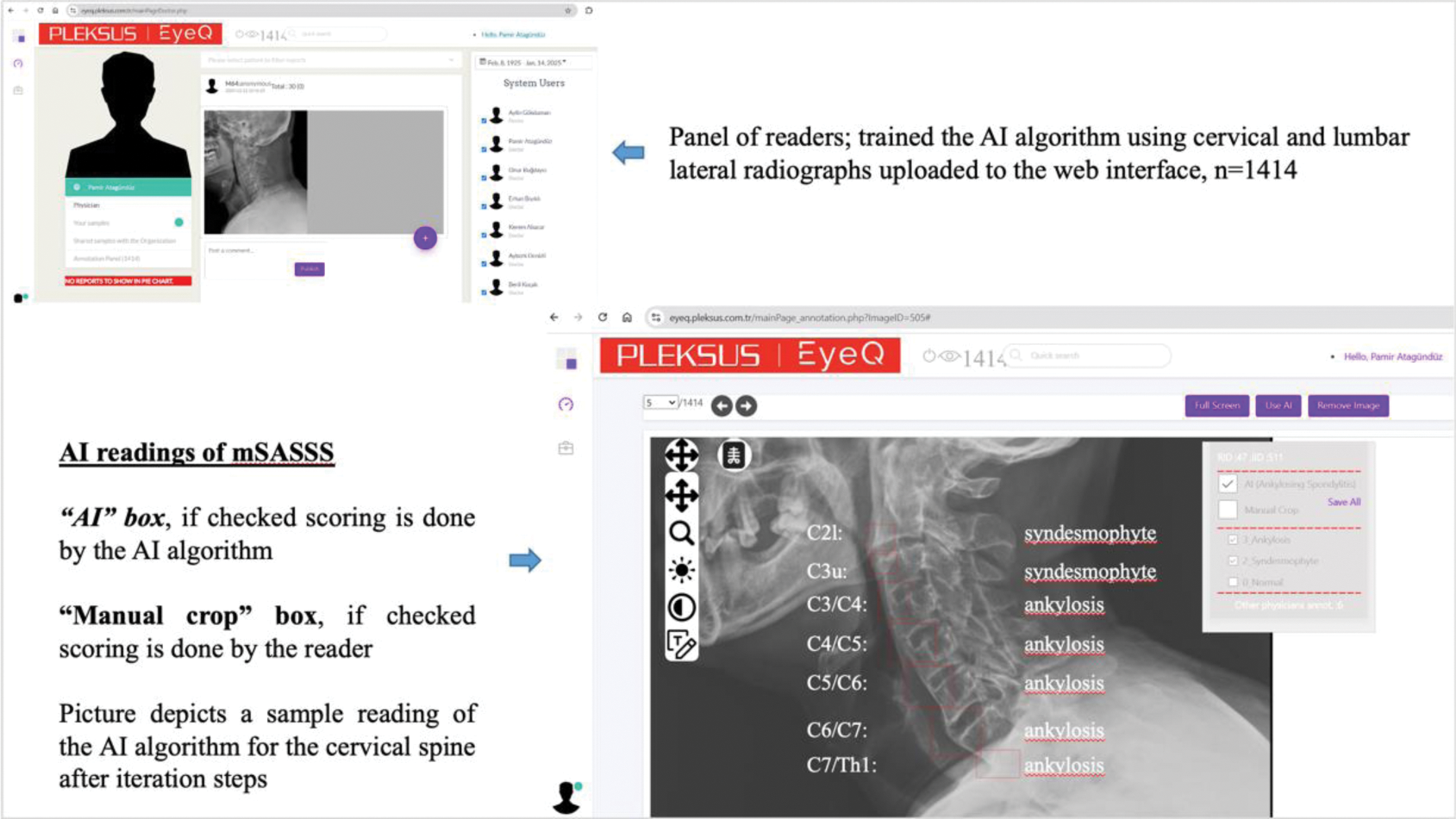

Background: Ankylosing spondylitis (AS) is a chronic inflammatory joint disease characterized by progressive and irreversible functional impairment. Radiographic progression in AS is commonly quantified using the modified Stoke Ankylosing Spondylitis Spine Score (mSASSS), which evaluates 24 spinal levels based on radiographic changes in the cervical and lumbar spine [1]. This process requires specialized expertise and involves a time-intensive manual assessment, limiting its routine clinical application.
Objectives: This study aimed to develop a deep learning-based artificial intelligence (AI) tool for automating the calculation of mSASSS to facilitate the assessment of radiographic progression in AS, reduce the burden on specialists, and enhance clinical efficiency.
Methods: A cloud-based labelling and data management platform was developed to collect and anonymize spinal radiographs for training the AI model. The labelling process was standardized, and inter- and intra-observer variability metrics were measured to ensure consistency. The deep learning model was built using YOLOv4 architecture augmented with a spatial attention mechanism [2]. The dataset was split into training (80%) and testing (20%) subsets, with sensitivity, specificity, and accuracy metrics calculated on the test set. The iterative training process consisted of three stages, refining the AI model’s performance at each step.
Results: The final AI model demonstrated high accuracy in detecting radiographic features of AS progression. The system achieved accuracy rates of 90.67% for normal vertebral corners, 76.75% for erosions, 76.99% for syndesmophytes, and 94.14% for ankylosis. Overall, the AI tool showed significant promise in automating mSASSS calculations and reliably identifying radiographic abnormalities.
Conclusion: The proposed deep learning-based AI tool successfully automates the calculation of mSASSS and demonstrates high accuracy in detecting radiographic features of AS. This innovation has the potential to enhance routine clinical workflows, facilitate large-scale studies, and improve the timely assessment of radiographic progression in AS patients. Future applications could expand to include spinopelvic parameters for a more comprehensive evaluation of disease progression.
REFERENCES: [1] MCW Creemers, MJAM Franssen, MA van ‘t Hof, F W J Gribnau, LBA van de Putte, PLC M van Riel, Assessment of outcome in ankylosing spondylitis: an extended radiographic scoring system, Annals of the Rheumatic Diseases, 2005, 64: 127-129.
[2] Chen, Zhixiong, et al., An object detection network based on YOLOv4 and improved spatial attention mechanism, Journal of Intelligent & Fuzzy Systems, 2022, 42.3: 2359-2368.
Interface and Scoring Method of Our Deep Learning-Based mSASSS Assessment Software
This figure demonstrates the interface and scoring method of our deep learning-based software designed for mSASSS (modified Stoke Ankylosing Spondylitis Spine Score) evaluation. It provides a visual representation of how AI-driven scoring is performed and highlights the program’s user-friendly interface for clinical and research applications.

Acknowledgements: This research was supported by the Turkish Scientific and Technological Research Council, TÜBİTAK 1507 - SME R&D Start-up Support Program [grant number 7220390].
Disclosure of Interests: None declared.
© The Authors 2025. This abstract is an open access article published in Annals of Rheumatic Diseases under the CC BY-NC-ND license (